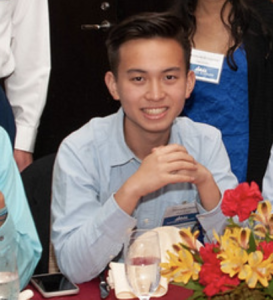This is part of a series of posts by recipients of the 2021 Career Services Summer Funding Grant. We’ve asked funding recipients to reflect on their summer experiences and talk about the industries in which they spent their summer. You can read the entire series here.
This entry is by Kenneth Pham, COL ’22
 As a third-year student majoring in Chemistry. I am fascinated by how unseen things (such as DNA, enzymes, and proteins) all function biochemically and interact with different drugs to develop and impact our health and healthy lifestyles. In the future, I wish to apply my scientific passion to medical school. I am drawn to medicine: a discipline where I get to learn and apply my love of science every day and see how my passion influences and aids people.
As a third-year student majoring in Chemistry. I am fascinated by how unseen things (such as DNA, enzymes, and proteins) all function biochemically and interact with different drugs to develop and impact our health and healthy lifestyles. In the future, I wish to apply my scientific passion to medical school. I am drawn to medicine: a discipline where I get to learn and apply my love of science every day and see how my passion influences and aids people.
Although I absolutely love the clinical and social aspects of the medical field, I believe that it is important doctors also play the role of academics. Without keeping up to date with the latest science, how will I be able to properly inform my patients what treatments they can expect to see in the future?
This summer, I did post-translational modification of protein research in the Burslem Lab. My main project this summer was to make mutations of a protein known as ubiquitin, which has been used to aid in actions such as protein degradation and DNA repair. To do this, I worked a lot with designing primers online, ordering them, and running then cloning them to see if they could make a mutation onto ubiquitin. I learned techniques such as running PCRs, gel electrophoresis, and starter culturing cells.
The main thing I learned from my lab experience this summer was, well, science is hard. As paradoxical as that may sound from the one getting the degree in science, I truly mean it. As much as I may have learned the reaction mechanisms for tests and NMR spectra for lab, that info gave me background knowledge that would help me in lab, but would not be representative of the work I did. For the first time, there was no textbook or lab procedure to tell me what exactly to do to get the “right answer”. This time around, I had to read up on dozens of scientific papers to help me understand what I needed to do in some way.




